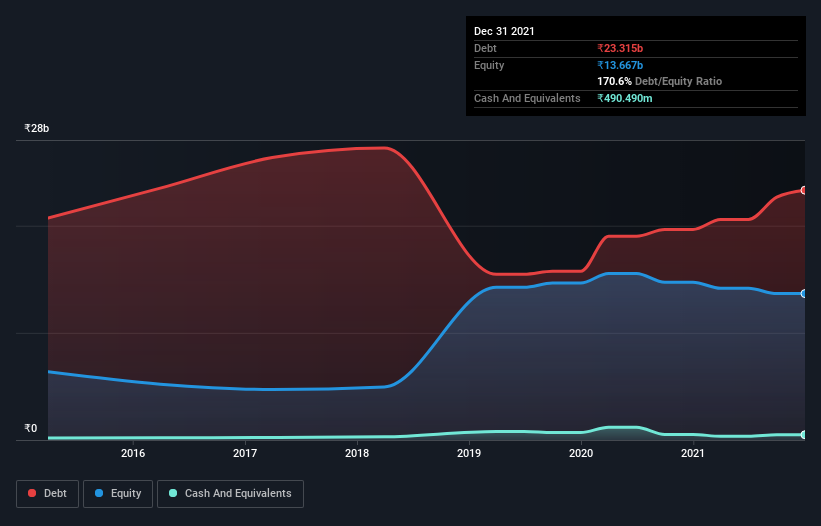
David Iben put it well when he said, 'Volatility is not a risk we care about. What we care about is avoiding the permanent loss of capital.' So it seems the smart money knows that debt - which is usually involved in bankruptcies - is a very important factor, when you assess how risky a company is. Importantly, Chalet Hotels Limited (NSE:CHALET) does carry debt. But should shareholders be worried about its use of debt?
When Is Debt Dangerous?
Generally speaking, debt only becomes a real problem when a company can't easily pay it off, either by raising capital or with its own cash flow. Part and parcel of capitalism is the process of 'creative destruction' where failed businesses are mercilessly liquidated by their bankers. While that is not too common, we often do see indebted companies permanently diluting shareholders because lenders force them to raise capital at a distressed price. Of course, debt can be an important tool in businesses, particularly capital heavy businesses. The first step when considering a company's debt levels is to consider its cash and debt together.
See our latest analysis for Chalet Hotels
What Is Chalet Hotels's Debt?
The image below, which you can click on for greater detail, shows that at September 2021 Chalet Hotels had debt of ₹23.3b, up from ₹19.6b in one year. On the flip side, it has ₹490.5m in cash leading to net debt of about ₹22.8b.

How Healthy Is Chalet Hotels' Balance Sheet?
Zooming in on the latest balance sheet data, we can see that Chalet Hotels had liabilities of ₹7.69b due within 12 months and liabilities of ₹20.5b due beyond that. Offsetting this, it had ₹490.5m in cash and ₹500.3m in receivables that were due within 12 months. So its liabilities outweigh the sum of its cash and (near-term) receivables by ₹27.2b.
While this might seem like a lot, it is not so bad since Chalet Hotels has a market capitalization of ₹58.0b, and so it could probably strengthen its balance sheet by raising capital if it needed to. But we definitely want to keep our eyes open to indications that its debt is bringing too much risk. The balance sheet is clearly the area to focus on when you are analysing debt. But ultimately the future profitability of the business will decide if Chalet Hotels can strengthen its balance sheet over time. So if you're focused on the future you can check out this free report showing analyst profit forecasts.
In the last year Chalet Hotels wasn't profitable at an EBIT level, but managed to grow its revenue by 5.5%, to ₹4.7b. That rate of growth is a bit slow for our taste, but it takes all types to make a world.
Caveat Emptor
Importantly, Chalet Hotels had an earnings before interest and tax (EBIT) loss over the last year. Indeed, it lost ₹456m at the EBIT level. When we look at that and recall the liabilities on its balance sheet, relative to cash, it seems unwise to us for the company to have any debt. So we think its balance sheet is a little strained, though not beyond repair. For example, we would not want to see a repeat of last year's loss of ₹881m. So we do think this stock is quite risky. The balance sheet is clearly the area to focus on when you are analysing debt. However, not all investment risk resides within the balance sheet - far from it. For example - Chalet Hotels has 1 warning sign we think you should be aware of.
When all is said and done, sometimes its easier to focus on companies that don't even need debt. Readers can access a list of growth stocks with zero net debt 100% free, right now.
New: AI Stock Screener & Alerts
Our new AI Stock Screener scans the market every day to uncover opportunities.
• Dividend Powerhouses (3%+ Yield)
• Undervalued Small Caps with Insider Buying
• High growth Tech and AI Companies
Or build your own from over 50 metrics.
Have feedback on this article? Concerned about the content? Get in touch with us directly. Alternatively, email editorial-team (at) simplywallst.com.
This article by Simply Wall St is general in nature. We provide commentary based on historical data and analyst forecasts only using an unbiased methodology and our articles are not intended to be financial advice. It does not constitute a recommendation to buy or sell any stock, and does not take account of your objectives, or your financial situation. We aim to bring you long-term focused analysis driven by fundamental data. Note that our analysis may not factor in the latest price-sensitive company announcements or qualitative material. Simply Wall St has no position in any stocks mentioned.
About NSEI:CHALET
Chalet Hotels
Owns, develops, manages, and operates hotels and resorts in India.
Reasonable growth potential with mediocre balance sheet.
Similar Companies
Market Insights
Community Narratives



